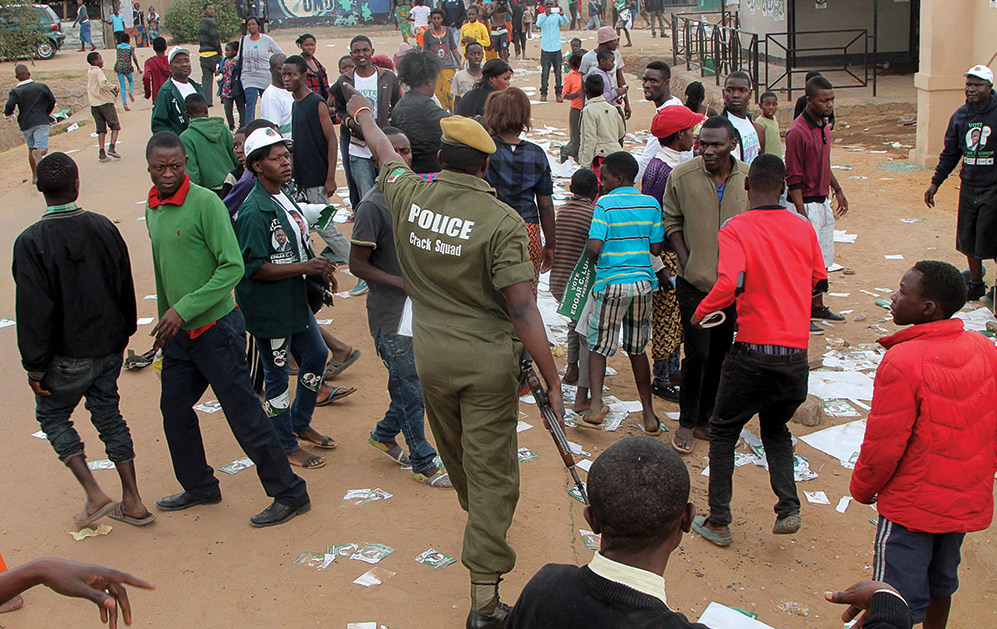Timely wake-up call for peace, unity
ZONDA walked into my office, his face more drawn than usual. Something had shifted. The anger from the past few weeks had been replaced by an unmistakable sense of worry—maybe even fear. He sank into the chair across from me, exhaling deeply, as if the weight of the world was pressing down on him.
“You okay, Zonda?” I asked, raising an eyebrow. “I was expecting some smiles, some jokes this week. But looks like I was wrong. What’s going on?”
He didn’t even crack a smile. “It’s this whole mess in Nyimba, man,” he said, leaning forward. “I don’t know if you’ve been following. The Mtilizi Ward by-election is over but there was some serious violence on Tuesday in Mtilizi during campaigns. Five people got arrested after the clashes at Daniel village. Some serious injuries too—bones broken and all. What happened?”
I could feel the tension in the air as he spoke. Zonda was usually calm, but this time, he was troubled.
“Whatever happened doesn’t sit right with me,” he said, shaking his head. What are we really doing to ourselves?”
“President Hakainde Hichilema has been calling for unity since assuming office in 2021, often stressing peace at various fora,” I responded, trying to keep things in perspective. “I’d rather see all citizens heed his calls for peace, rather than letting things spiral like this.”
Zonda’s frustration was palpable. “Why didn’t the political players in Nyimba listen to the President’s message? Why didn’t they choose dialogue and unity over violence? It’s like the message didn’t get through.”
I nodded. His concerns weren’t unfounded. “It’s a red flag, that’s for sure,” I said. “But we can only hope it won’t become a trend.”
He leaned back, his expression thoughtful. “I used to believe in the ‘One Zambia, One Nation’ motto, but with what’s happening, it feels like it’s just a slogan. We need to turn that around—make it a principle we live by.”
Zonda rubbed his forehead, trying to make sense of the violence. “This has to be a turning point,” he said. “We need to change our political culture—move away from insults and violence, and instead embrace love and unity, regardless of tribe or party.”
I could see where he was coming from. It was more than politics—it was about the direction we’re headed as a country. “You’re right,” I said. “It’s not just about Nyimba. It’s about the kind of politics we want for this country.”
He looked down, lost in thought for a moment. “Boss, politics should be about ideas—about competing on a level of ideas. Why can’t we debate, discuss, and vote without resorting to violence?”
He stood up, pacing. It was rare for Zonda to act this way. “I used to think politics was noble,” he continued quietly. “It was supposed to be about helping people, about improving lives not fighting.”
I let him speak, understanding the depth of his frustration. “We’ve made progress as a nation, sure,” I said. “But are we losing our humanity in the process?”
He turned to face me. “Should we let politics divide us like this? Should we let young people be pawns in battles they don’t even understand?”
His questions hung in the air, unanswered. “Zonda, the questions you’re asking should be asked by all of us— by voters, by political parties, by the whole country. We can’t afford to look away.”
I added, “And the youth, the supposed future leaders… they need to hear this too. The message from government officials is clear—don’t let yourselves be used in political violence. Don’t be a part of the cycle.”
Zonda sat down again, but this time, his eyes showed a glimmer of hope. “Maybe it’s not too late to turn this around,” he said, his voice gaining strength. “We still have time. We must remember that our strength lies in unity, not division. In ballots, not bloodshed.”
“Exactly,” I agreed. “The violence in Nyimba? Those responsible must be held accountable.”
Zonda took a deep breath, his resolve building.
“We need to focus on progress—creating jobs, boosting copper production, modernising our country. We can’t wait around for donor funding. It’s drying up. We need to address illegal mining, clamp down on land grabs.”
He stood to leave, his energy not as fierce, but still alive. “Let’s hope this country wakes up before more bones are broken, before we lose more than just elections.” “President Hichilema’s message is loud and clear: peace, unity, and love—period!
As Zonda left, I sat back in my chair, his words echoing in my mind. Politics is meant to be a contest of ideas—not fists. When it becomes about broken bones, we all lose—no matter who wins.
Send comments to andrewmosesmiti@ gmail.com
•PRESIDENT Hakainde Hichilema has been calling for unity since assuming office in 2021.
•TIME to change political culture and move away from insults and violence.








